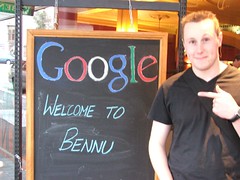Do you want to be successful with your internet marketing? Are you making daily sales and tracking customer traffic? Is Google your internet friend or your worst enemy? In this article, we will look at all the ways you can take advantage of what Google has to offer. Make Google your friend and laugh all the way to the bank. Try and trick Google and you will regret the day your website was born!
Making Friends with Google, the 800-pound Gorilla
There is an old joke that goes; what do you feed an 800-pound gorilla? "Anything it wants.” Moreover, if that 800-lb gorilla happens to be the world’s most popular search engine named Google, then you're going to need a ton of bananas, or in this instance, a ton of content.
Having worked the web since 1995, I can tell you that I have seen a lot of search engines come and go. To date, none of these search engines has been big and bad enough to control the Internet. Then along came Google. Started in 1998 by Sergey Bryn and Larry Page, Google’s superior and proprietary search algorithms quickly gobbled up market share, particularly after going public in 2004. Today, Google controls more than 81% of the search market worldwide. Therefore, if you hope to make money online then you are going to have to come to terms with the King Kong of search engines.
| Happy Gorilla (Photo credit: San Diego Shooter) |
Give Google What it Wants
| Google Happy Hour (Photo credit: ctudball) |
On-Page Optimization is Now Only 25% of the Equation
My advice to those who wish to thrive online is simply this: Give Google what it wants. Today, that means lots of content. Gone are the days when you could create a website, launch it and not make a change for three years. The face of Search Engine Optimization has chan
ged as well. Before the turn of the century, everything the search bots needed to rank a site was contained on the home page. That is no longer the case. In fact, only 25% of the criteria used to rank a site today are on-site. On top of this, you must also make sure that all your pages contain the proper metadata for the search bots, otherwise those pages will not be properly evaluated or help your ranking.
| English: Reactive Search Optimization (RSO), at the boundary between Computer Science, Optimization, and Machine learning (Photo credit: Wikipedia) |
The other 75% is off-site. It is composed of such things as blog posts, social posts, podcasts, picture galleries and videos. The majority of ranking today is determined by the quality and quantity of the content plus how often it is posted. By quality, I mean the search bots evaluate how others value your content by how many people read and share your content. That’s right, the search bots can not only read your content they can evaluated it in context and determine if it is being read. They can tell the difference between an article-length blog and a tweet. In addition, they can determine if you’re trying to use keywords in an inappropriate way. While they can’t comprehend video yet, they can judge such things as length, number of videos on a channel, how often they have been viewed, keywords, comments, reviews and likes!
Top 12 Must-Have Optimization Items
Now I'm not saying the Web page optimization is not important. Leave your pages un-optimized and they can never score very high. I believe that there are certain things that every web page needs to contain. Therefore, here is my top twelve list of on page items to help you maximize your “on page” website optimi
- Make sure "all" Meta tags are filled out properly and match the content of the page. Do this for all pages, not just the home page.
- Make sure the Meta tags are technically correct in length and format.
- Make sure all ALT Tags have accurate descriptions that match the content.
- Added Google analytics to all your pages if possible. This will also help you analyze traffic.
- Minimize the use of Dynamic pages and server side images.
- Minimize the use of Flash, bots can't read animated flash objects.
- Minimize the use of Java applets and or Java Scripts Blocks if possible. Too much jumping around can confuse the bots and is they can figure it out that part is not scored or is scored poorly. This also goes for using too much CSS.
- Minimize the use of hidden text. Keyword stuffing is a “no no” and will cost you ranking.
- Do not have your page execute a redirect on loading. Google looks at this suspiciously.
- Do not use ActiveX if possible, it is not fully supported by most browsers (including Google Chrome) and is mainly designed for the Internet Explorer.
- Do not use VBScripts, these only run on the Internet Explorer and most browsers can’t read them (including Google Chrome).
- Minimize the use and frequency of Meta Refresh tags unless you're using it to refresh content from a News Feed.
Eating your Own Brand
| Jessica Lee: Google Maps Product Manager (Photo credit: keso) |
More importantly, not only do the search bots respect content, so do your prospects and customers. Businesspeople may lament the fact that creating weekly blogs, daily social posts and a couple of videos per month consumes a lot of time. All I can tell you is this; from your audience’s (and Google’s) perspective, this is time well spent. Consumers today are information junkies. They prefer being shown as to being told. They will spend more time today checking you and your product line out than ever before. Studies show that people spent almost twice as much time as they did in 2011 researching products before they make a purchase. Moreover, why not, it’s easy and often saves them money.
Whose Reputation is on the Line?
| Social Media Marketing (Photo credit: DigitalRalph) |
| Smilie Face (Photo credit: a4gpa) |
Last but not least, you need to make the care and feeding of Google, the 800-lb gorilla in the room a priority. Not providing Google and your audience the content it wants will only turn your website into a billboard in the internet desert.
Top 6 Secrets to Making the Google Happy
To summarize, here is my list of the top six things you can do to make Google happy and your friend! Use them and you will be seen leaving the bank with a smile. Ignore them and your online business will suffer.
- Don't ignore Google. Interact with Google properties on a weekly if not daily basis. Post to your Google properties like YouTube, Google+, Google Local, Maps and Picasa often and consistently. Also when you post to other non Google properties, mention and create back links to your Google properties as well.
- Actively engage your customers to visit and share your websites, landing pages, blogs and other sites. Ask them to provide Google +1's, five-star rating and favorable reviews. Google loves positive feedback and so do customers. This will definitely raise your click through rate!
- Give clients, customers and visitors reasons to visit and come back. Provide value added content, useful resources, hard to find material, free useful content and discount coupons for your products. Encourage your followers to share these resources and they will.
- Google loves authoritative back links and legitimate business back links of any kind. Engage in creative and reciprocal alliances with legitimate businesses. Don't forget to create as many back links and cross-links between all your internet properties. This includes all of your social sites as well. If you don't think your pages are important neither will Google.
- Be committed to quality, quantity and consistency. These need to be your mantra. Prodigiously producing quality content on a consistent basis is what Google is looking for. So is your audience!
- Provide a wide variety of multimedia content. Don't just do social post or back links or blogs or videos! Do all of them. Add podcast, picture galleries, articles, useful lists and more. Try to produce at least five posts of various kinds to five different properties each day. At the end of a year, you will have added 9125 back links to your web properties. A significant number by any measure, and if that number is bigger than your competitors you win.
 In this article, I discussed how Google controls more than 81 percent of the search market today. I have also emphasized how Google owns many of the top ten internet properties and have suggested that not pleasing Google is nothing short of committing internet-marketing suicide. I have provided my top twelve techniques needed to be addressed to optimize any web page and I have listed my top six methods that make and keep Google happy. With this knowledge, you are mentally equipped to build your battle plan to make the 800 lb Gorilla your friend. These techniques will help you win the internet marketing war for profitability. If you have enjoyed this article, share it with your friends, if you have something to add to this discussion, enter it in the comment sections.
In this article, I discussed how Google controls more than 81 percent of the search market today. I have also emphasized how Google owns many of the top ten internet properties and have suggested that not pleasing Google is nothing short of committing internet-marketing suicide. I have provided my top twelve techniques needed to be addressed to optimize any web page and I have listed my top six methods that make and keep Google happy. With this knowledge, you are mentally equipped to build your battle plan to make the 800 lb Gorilla your friend. These techniques will help you win the internet marketing war for profitability. If you have enjoyed this article, share it with your friends, if you have something to add to this discussion, enter it in the comment sections.
That’s our opinion; we look forward to hearing yours.
If you found this article useful, share it with your friends, families and co-works. If you have a comment related to this article, leave it in the comment sections below. If you would like a free copy of our book, "Internet Marketing Tips for the 21st Century", fill out the form below.
Related articles
If you found this article useful, share it with your friends, families and co-works. If you have a comment related to this article, leave it in the comment sections below. If you would like a free copy of our book, "Internet Marketing Tips for the 21st Century", fill out the form below.
Hector Cisneros is COO and director of Social Media Marketing at Working the Web to Win, an award-winning Internet marketing company based in Jacksonville, Florida. He is also co-host of the weekly Internet radio show, "Working the Web To Win" on BlogTalkRadio.com, which airs every Tuesday at 4 p.m. Eastern. Hector is a syndicated writer and published author of “60 Seconds to Success.”
Since 1995, Carl Weiss has been helping clients succeed online. He owns and operates several online marketing businesses, including Working the Web to Win and Jacksonville Video Production. He also co-hosts the weekly radio show, "Working the Web to Win," every Tuesday at 4 p.m. Eastern on BlogTalkRadio.com.
Related articles

















Google is always a good friend you can search for any information and can also earn money through using it's services such as such as Google Adsence,blogs.
ReplyDeleteThanks
Johnny Depp
Make Money Online